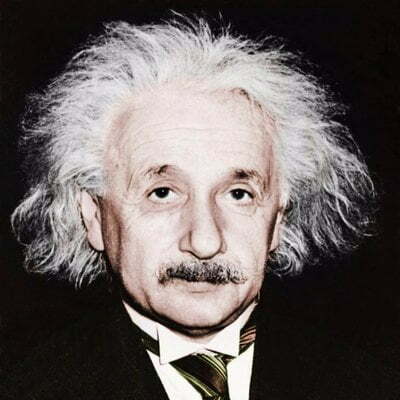

A Truly Beautiful Mind
Glossary:
- Freak: a word used disapprovingly to talk about a person who is unusual and doesn’t behave, look or think like others
- Amateur: doing something for personal enjoyment rather than as a profession
- Regimentation: order or discipline taken to an extreme
- Stifled: unable to breathe; suffocated
- Liberal: willing to understand and respect other’s opinions
- Ally: a friend or an associate
- Philistines: a word used disapprovingly to talk about people who do not like art, literature or music.
- Patent: a document that gives the rights of an invention to an investor.
- Absolute: measured in itself, not in relation to anything else.
- Unraveling: starting to fail
- Faltered: became weak
- Deflected: change direction because it hit something
- In an uproar: very upset
- Missive: letter, especially long and official
- Visionary: a person who can think about the future in an original and intelligent way
Q.2. Who had these opinions about Einstein?
- He was boring.
Ans: His playmates.
- He was stupid and would never succeed in life.
Ans: A headmaster
- He was a freak.
Ans: His mother
Q.3.Explain what the reasons for the following are:
- Einstein leaving the school in Munich for good.
Ans: Einstein left the school in Munich because he did not like discipline of the school. He hated the school’s regimentation and often clashed with teachers.
- Einstein wanting to study in Switzerland rather than in Munich.
Ans: Albert’s parents moved to Milan and left their son with relatives. After prolonged discussion, Einstein got his wish to continue his education in German – speaking Switzerland. Actually, it was more liberal than Munich.
- Einstein seeing in Mileva an ally.
Ans: Einstein saw in Mileva Marie an ally against the “Philistines”- those people in his family and at the university with whom he was constantly at odds. He found that she was a “clever creature”.
- What do these tell you about Einstein?
Ans: These tell that Einstein was a genius and had the capabilities to achieve his targets. Moreover, he had his own view of life. He liked freedom too much.
Q4.
What did Einstein call his desk drawer at the patent office? Why?
Ans: Einstein called his desk drawer at the patent office the “bureau of theoretical physics”. Einstein was actually developing his own ideas in secret and his drawer had all the evidences which could reveal the secret.
Q5. Why did Einstein write letter to Franklin Roosevelt?
Ans: With the emergence of Nazi in Germany, Einstein emigrated to the United States. It was the fact that the Nazi had the ability to develop the atomic bomb. It could destroy the whole world. So he warned Franklin D. Roosevelt in his letter.
Q6. How did Einstein react to the bombing of Hiroshima and Nagasaki?
Ans: The atomic bomb devastated the Japanese cities of Hiroshima and Nagasaki. He was deeply shaken by the extent of the destruction and wrote a public missive to the United Nations.
Q7. Why does the world remember Einstein as a ‘world citizen’?
Ans: The world remembers Einstein as a ‘world citizen’ because he believed in universal peace. When there was the rat race for becoming atomic power, he was worried about the aftermaths of the bomb. He was really a world citizen who was concerned with humanity.
Q8. Here are some facts from Einstein’s life. Arrange them in chronological order.
Ans:
1] Einstein in born in the German city of Ulm.
2] Einstein attends a high school in Munich.
3] Einstein’s family moves to Milan.
4] Tired of the school’s regimentation, Einstein withdraws from school.
5] Einstein joins a University in Zurich where he meets Mileva.
6] He works in a patent office as a technical expert.
7] Einstein publishes his special theory of relativity.
8] He provides a new interpretation of gravitation.
9] He is awarded the Nobel Prize in Physics.
10] When Hitler comes to power, Einstein leaves Germany for the United States.
11] Einstein writes a letter to U.S President Franklin D. Roosevelt and warns against Germany’s building of an atomic bomb.
12] Einstein Dies
